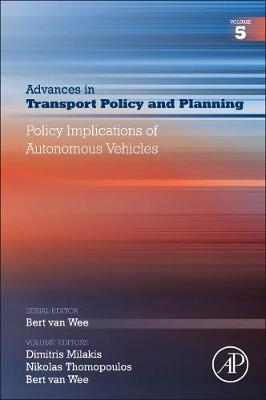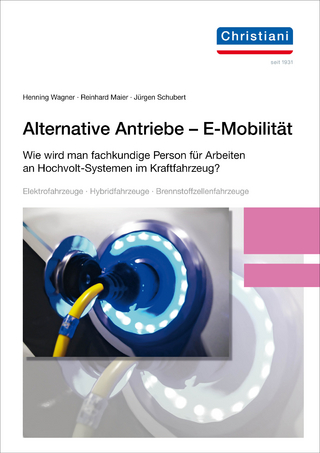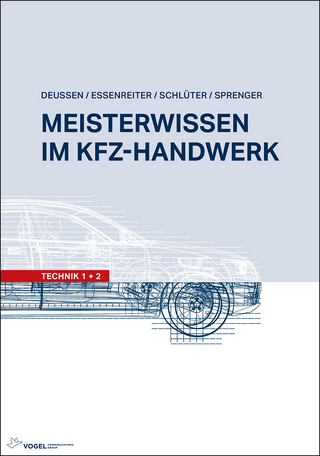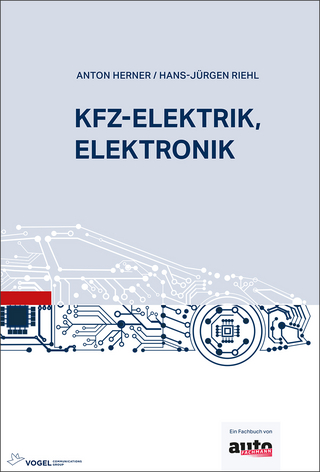
Policy Implications of Autonomous Vehicles
Academic Press Inc (Verlag)
978-0-12-820191-6 (ISBN)
Dr. Dimitris Milakis is the Head of the ‘Automated driving and new mobility concepts’ research group at the Institute of Transport Research, German Aerospace Center (DLR). His latest research focuses on the social acceptance and long-term societal implications of emerging mobility technologies (e.g. automated vehicles, vehicle sharing, MaaS and Hyperloop) for accessibility, spatial structure, social inclusion, public health, planning and mobility governance. He was previously affiliated with TU Munich (Visiting Professor), TU Delft (Assistant Professor, Marie Curie Research Fellow), UC Berkeley (Marie Curie Research Fellow), University of Patras (Adjunct Lecturer), and National Technical University of Athens (Post-doctoral Researcher). Dr. Nikolas Thomopoulos is a Senior Lecturer in Transport at the Department of Tourism & Transport, University of Surrey and the Chair of the WISE-ACT COST Action (Wider Impacts and Scenario Evaluation of Autonomous and Connected Transport), which includes more than 150 experts in 41 countries. Previously he was a researcher at LSE Cities and at the Institute for Transport Studies at the University of Leeds, where he was also a Marie Curie fellow. His contemporary research focuses on Autonomous Vehicles, Electric Vehicles, MaaS, bicycle sharing, whereas his broader research interests include mobility innovation management, project evaluation and socio-economic assessment in transport. Bert van Wee is full professor in Transport Policy at Delft University of Technology, the Netherlands, faculty Technology, Policy and Management. In addition he is scientific director of TRAIL research school. His main interests are in long-term developments in transport, in particular in the areas of accessibility, land-use transport interaction, (evaluation of) large infrastructure projects, the environment, safety, policy analyses and ethics. https://www.tudelft.nl/tbm/over-de-faculteit/afdelingen/engineering-systems-and-services/people/full-professors/profdr-gp-bert-van-wee/
1. Factors affecting traffic flow efficiency implications of connected and autonomous vehicles: A review and policy recommendations
Santhanakrishnan Narayanan, Emmanouil Chaniotakis and Constantinos Antoniou
2. Automated bus systems in Europe: A systematic review of passenger experience and road user interaction
Daniël D. Heikoop, J. Pablo Nuñez Velasco, Reanne Boersma, Torkel Bjørnskau and Marjan P. Hagenzieker
3. Cyber security and its impact on CAV safety: Overview, policy needs and challenges
Christos Katrakazas, Athanasios Theofilatos, George Papastefanatos, Jérôme Härri and Constantinos Antoniou
4. Cybersecurity certification and auditing of automotive industry
Tomás J. Mateo Sanguino, José M. Lozano Domínguez and Patrícia de Carvalho Baptista
5. The wider use of autonomous vehicles in non-commuting journeys
Simon Kimber, Lauren Siegel, Scott Cohen and Nikolas Thomopoulos
6. Policy implications of the potential carbon dioxide (CO2) emission and energy impacts of highly automated vehicles
Jan Anne Annema
7. Potential health and well-being implications of autonomous vehicles
Patrick A. Singleton, Jonas De Vos, Eva Heinen and Baiba Pudane
8. Data protection in a GDPR era: An international comparison of implications for autonomous vehicles
Federico Costantini, Nikolas Thomopoulos, Fabro Steibel, Angela Curl, Giuseppe Lugano and Tatiana Kováciková
9. Ethical issues concerning automated vehicles and their implications for transport
Ebru Dogan, Federico Costantini and Rémy Le Boennec
10. Governance cultures and sociotechnical imaginaries of self-driving vehicle technology: Comparative analysis of Finland, UK and Germany
Miloš N. Mladenovic, Dominic Stead, Dimitris Milakis, Kate Pangbourn and Moshe Givoni
11. Wider implications of autonomous vessels for the maritime industry: Mapping the unprecedented challenges
Hadi Ghaderi
12. The potential for automation to transform urban deliveries: Drivers, barriers and policy priorities
Daniela Paddeu and Graham Parkhurst
13. Overall synthesis and conclusions
Bert van Wee, Dimitris Milakis and Nikolas Thomopoulos
| Erscheinungsdatum | 31.07.2020 |
|---|---|
| Reihe/Serie | Advances in Transport Policy and Planning |
| Verlagsort | San Diego |
| Sprache | englisch |
| Maße | 152 x 229 mm |
| Gewicht | 680 g |
| Themenwelt | Sachbuch/Ratgeber ► Natur / Technik ► Fahrzeuge / Flugzeuge / Schiffe |
| Recht / Steuern ► EU / Internationales Recht | |
| Recht / Steuern ► Privatrecht / Bürgerliches Recht ► Transportrecht | |
| ISBN-10 | 0-12-820191-6 / 0128201916 |
| ISBN-13 | 978-0-12-820191-6 / 9780128201916 |
| Zustand | Neuware |
| Informationen gemäß Produktsicherheitsverordnung (GPSR) | |
| Haben Sie eine Frage zum Produkt? |
aus dem Bereich


